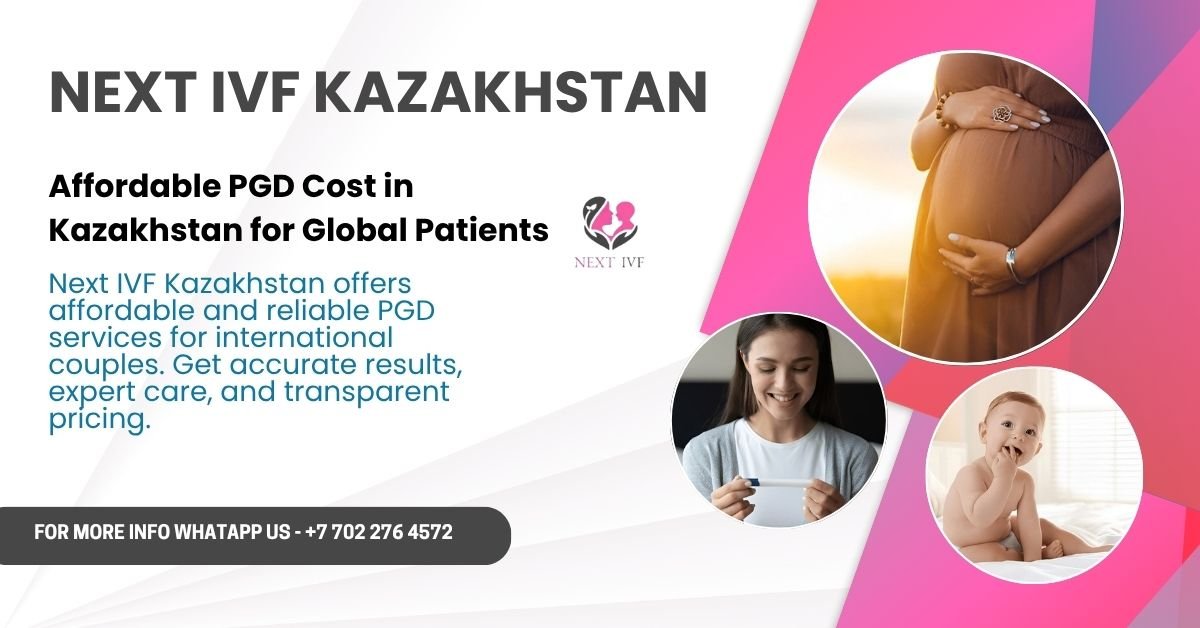How Much Does PGD Cost in Kazakhstan?
If you and your partner are considering fertility treatments, you might have come across the term PGD, or Preimplantation Genetic Diagnosis. PGD is a powerful technology used alongside IVF that helps identify genetic disorders in embryos before they are implanted into the uterus. This advanced test can increase the chances of a healthy pregnancy and reduce the risk of passing on inherited conditions.
Kazakhstan, known for its modern fertility clinics and affordable healthcare, offers PGD services that are accessible and effective. But before you decide, it’s important to understand what PGD is, how it works, its benefits, and, of course, the cost involved.
In this article, we’ll take you through everything about PGD Cost in Kazakhstan from the process to the pricing, and what factors affect the cost. We’ll also guide you on choosing the right clinic so you can make an informed decision for your family’s future.
What is PGD (Preimplantation Genetic Diagnosis)?
PGD stands for Preimplantation Genetic Diagnosis. It’s a specialized genetic test performed on embryos created during IVF before they are transferred to the woman’s womb. The main goal of PGD is to check if the embryos carry any specific genetic mutations or chromosomal abnormalities.
Why is this important? Some couples carry genes for inherited diseases such as cystic fibrosis, Tay-Sachs disease, or sickle cell anemia. Others may have experienced recurrent miscarriages or failed IVF attempts due to chromosomal problems in embryos. PGD helps these couples by ensuring only healthy embryos are implanted, increasing the chances of a successful and healthy pregnancy.
How Does PGD Work?
The PGD process is carried out alongside IVF treatment and involves several steps:
- Ovarian Stimulation: Like in IVF, the woman takes fertility medications to stimulate her ovaries to produce multiple eggs.
- Egg Retrieval: Once mature eggs develop, they are collected from the ovaries in a minor surgical procedure.
- Fertilization: The eggs are fertilized with sperm in the laboratory to create embryos.
- Embryo Biopsy: After 3 to 5 days of embryo growth (blastocyst stage), a few cells are carefully removed from each embryo. This is done without harming the embryo.
- Genetic Testing: The biopsied cells undergo genetic analysis to detect any specific gene mutations or chromosomal abnormalities.
- Embryo Selection: Only embryos that are free from the tested genetic issues are selected for transfer.
- Embryo Transfer: Healthy embryos are implanted into the woman’s uterus.
- Pregnancy Test: After about two weeks, a pregnancy test confirms whether the embryo has implanted successfully.
Benefits of PGD

1. Avoid Genetic Disorders
PGD allows for the detection and exclusion of embryos carrying serious inherited genetic diseases. This means couples can significantly reduce the risk of passing on conditions such as cystic fibrosis, Tay-Sachs disease, or sickle cell anemia to their child, helping ensure a healthier baby.
2. Improved IVF Success Rates
By selecting only embryos that are genetically normal, PGD improves the chances of successful implantation and pregnancy. This targeted approach also lowers the likelihood of miscarriage caused by chromosomal abnormalities, making IVF cycles more effective and efficient.
3. Peace of Mind for Parents
Undergoing PGD provides emotional relief and confidence to couples. Knowing that the embryos have been tested and cleared of specific genetic conditions offers reassurance and reduces anxiety during the IVF journey.
4. Informed Family Planning
For couples who are carriers of hereditary diseases, PGD offers an opportunity to have biological children without passing on those genetic issues. This allows for thoughtful family planning with minimized health risks for future generations.
PGD Cost in Kazakhstan

One of the biggest questions couples have when considering PGD is how much it costs. The good news is, compared to many Western countries, PGD treatment in Kazakhstan is more affordable while maintaining high standards of care and success.
| PGD services in Kazakhstan | PGD cost in Kazakhstan (USD) |
| IVF cycle | $2,000 – $3,500 |
| PGD genetic testing (per cycle) | $1,000 – $2,000 |
| Medication (fertility drugs) | $500 – $1,000 |
| Additional procedures (ICSI, biopsy) | $300 – $600 |
| Consultation and monitoring | $200 – $500 |
What Does the PGD Cost Include?
When you pay for PGD (Preimplantation Genetic Diagnosis) as part of your IVF treatment, the cost covers several important components to ensure the best chance of a healthy pregnancy:
1. IVF Procedure
This includes the full IVF cycle—starting from egg retrieval, fertilization of the eggs in the lab, growing embryos (embryo culture), and finally transferring the selected embryos back into the uterus.
2. Genetic Testing
The core part of PGD is the biopsy, where a few cells are carefully taken from each embryo. These cells undergo detailed laboratory analysis to check for any genetic abnormalities or inherited diseases.
3. Medications
Fertility drugs used to stimulate the ovaries to produce multiple eggs are included in the cost. These medications are vital for a successful IVF cycle and PGD process.
4. Additional Techniques
If necessary, advanced methods like ICSI (injecting a single sperm directly into an egg) are part of the treatment. Sometimes, embryos might be frozen (cryopreservation) to wait for genetic test results or future transfer.
5. Doctor’s Consultation and Monitoring
Throughout the entire process, from initial consultation to treatment completion, the cost includes doctor visits, ultrasound scans, blood tests, and counseling to guide you through every step.
How to Choose the Best Clinic for PGD in Kazakhstan?

Choosing the right clinic for your PGD treatment is one of the most important steps on your fertility journey. It can make a big difference in your chances of success and how comfortable you feel throughout the process. Here are some key points to consider when picking a clinic:
1. Success Rates
Always check the clinic’s success rates for PGD and IVF treatments. The best clinics are transparent about their numbers and have consistently high pregnancy rates, which shows their expertise and reliability.
2. Expertise of the Team
Look for clinics staffed with experienced fertility specialists, geneticists, and embryologists who have specific training in PGD. Their knowledge and skills are crucial for accurate genetic testing and embryo selection.
3. Advanced Technology
PGD requires cutting-edge lab equipment and technology. Make sure the clinic uses the latest genetic testing tools and maintains high standards for lab cleanliness and procedures.
4. Patient Support
Going through PGD can be emotionally and physically demanding. Choose a clinic that offers strong patient support, including counseling and personalized treatment plans tailored to your unique needs.
5. Transparent Costs
It’s important to understand the full cost upfront. The best clinics provide clear pricing details without hidden fees or surprise charges, so you can plan your budget confidently.
Why trust Next IVF Kazakhstan?

Struggling with infertility can be emotionally and physically challenging, but you don’t have to face it alone. At Next IVF Kazakhstan, we combine advanced science with genuine care and compassion to help you realize your dream of becoming a mom and dad.
Our centre is dedicated to supporting every couple with personalized fertility solutions tailored to your unique needs. We understand how deeply you desire to start or expand your family, and that’s why our expert team including IVF specialists, gynecologists, embryologists, and supportive staff stands by your side every step of the way.
Why choose Next IVF Kazakhstan as your trusted fertility partner?
- Comprehensive treatments: From IVF, IUI, and frozen embryo transfer to ovum and semen donation, laparoscopy, ICSI, PGD, and male infertility care — we offer the full spectrum of cutting-edge fertility services.
- High success rates: Our proven protocols and experienced specialists maximize your chances of success.
- Affordable care: Quality fertility treatment should be accessible to all. We provide world-class solutions at pocket-friendly prices without compromising on care or outcomes.
Don’t wait any longer to begin your journey toward parenthood. Contact Next IVF Kazakhstan today at +91 7827636596 or email us at info@nextivf.com. Together, we’ll make your dream of having a family a beautiful reality — with the right centre, the right doctors, and the right care.
Conclusion
PGD is a powerful tool that gives couples hope by helping them avoid serious genetic disorders and improving the chances of a successful, healthy pregnancy. Kazakhstan is quickly becoming a popular destination for PGD treatment because it offers world-class medical care combined with affordable pricing.
The clinics here use advanced technology and have experienced specialists who provide personalized care to each patient. If you are considering PGD, it’s important to do thorough research, speak openly with fertility experts, and choose a clinic where you feel comfortable and supported. This way, you can focus on your journey to parenthood with confidence and peace of mind.
Frequently Asked Questions (FAQs)
1. Is PGD covered by health insurance in Kazakhstan?
Currently, most health insurance plans in Kazakhstan do not cover the cost of PGD. This means that PGD is usually paid for out of pocket. It’s a good idea to check with your insurance provider before starting treatment.
2. How long does the PGD testing process take?
After the embryos are biopsied, the genetic testing typically takes about 7 to 14 days. The clinic will keep you updated on the results so you can plan the next steps in your IVF cycle.
3. Does PGD guarantee the birth of a healthy baby?
While PGD significantly lowers the risk of passing on certain genetic conditions, it does not guarantee a completely healthy baby. Other factors, such as the mother’s health and pregnancy complications, can still affect the outcome.
4. Is the PGD procedure painful or risky for the mother or embryos?
The embryo biopsy is performed with great care and does not harm the embryos. Women may experience some discomfort from the IVF process itself, such as hormone injections and egg retrieval, but these are generally well-tolerated and safe under medical supervision.
5. Can PGD test for all genetic diseases?
PGD can detect many common inherited disorders, including cystic fibrosis, Tay-Sachs disease, and certain chromosomal abnormalities. However, not all genetic diseases have tests available, so it’s best to discuss your specific concerns with a genetic counselor.
6. How many embryos are usually tested during PGD?
The number varies depending on how many eggs are retrieved and fertilized, but typically several embryos are biopsied. Testing multiple embryos helps ensure the selection of the healthiest embryos for transfer.
Read Also:


